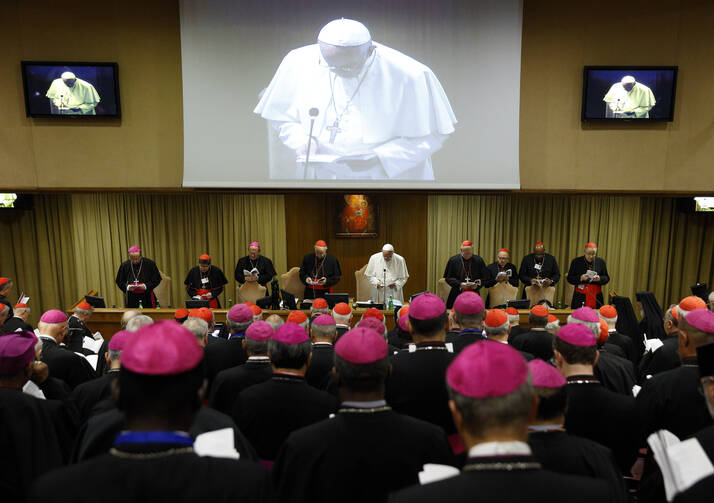The 318 participants attending the meeting of the Synod of Bishops on the family have raised or discussed a wide range of topics during the first four days of this gathering. Among them are the terrible, destructive impact that war, armed conflict, poverty, unemployment, persecution and violence against women and children have on families across the globe.
Participants also gave considerable attention to the theme of inclusion and what this means in terms of the family and the church in relation to couples who are cohabiting or divorced and remarried civilly. In this context they also discussed the church’s approach to homosexual persons and the great need to empower women in the church. Again and again they emphasized the urgent need for the church to develop an appropriate language with which to speak to the modern world and to communicate the Gospel message.
It was evident that the message of Pope Francis on inclusion was being warmly embraced by many bishops worldwide. One prelate criticized the synod’s working document for being too focused on problems. He reminded the assembly that “the family is what people treasure most, care about most passionately.”
He emphasized that “many families give a powerful witness to the church.” He said families “never withdraw a loving welcome home, even if they are dismayed by certain behavior” of some members.
“The entire church must learn this pathway of ‘tough love,’ a love that is compassionate, honest and always seeking to find and nurture all that is good.”
On the same theme, a European participant proposed that the church extend itself to “those whose marriages have broken, those who have remarried and welcomed children in a second union” as well as “homosexuals, whether chaste or celibate, or in relationships, as well as their children” because “they [all] belong to families, our families, the human family and the family of God.”
He said it was important for the church “to discern the reasons for the responses it offers in the light of the principle of inclusion.” He told the assembly that “much debate has reduced the arguments involving these complicated situations to an ‘either-or,’ a choice between the austerity of justice and the growth offered by mercy.”
“This,” he said, “runs the serious risk of exclusion and missing the relation between the church and the world and the men and women of today, which is so central to Vatican II’s ‘Gaudium et Spes’—the document on the church in the modern world.”
Many synod fathers confirm that there is consensus in the assembly that a rich, positive affirmation of the Christian family must be reflected in the final synod document. Many also said that the final text should reflect a merciful approach and openness to those who are not reaching the Christian ideal or are in difficulties of various forms, while others are insisting on a strong affirmation of the traditional Christian teaching on marriage and the family. It is far from clear at this stage how the final document will cope with these differing emphases.
A number of the synod participants touched on the issue of violence against women. One African bishop told the plenary assembly that “in some African countries women are subjected to conditions of violence and dehumanization” due to situations of war, ethnic violence, domestic violence, situations of polygamy, separation and divorce and “the discrimination of the girl child.” He urged the church to help promote women through education and other means.








